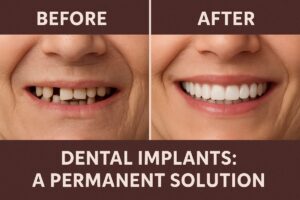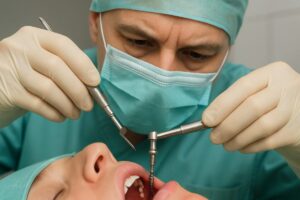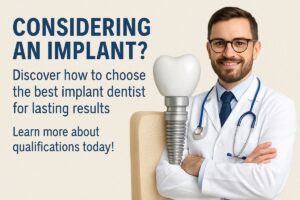Do not get dental implants until you read this: dental implants can change your life, but rushing into them can lead to failure, extra surgeries, and higher costs. This article gives clear reasons to pause, questions to ask, and safer next steps. If you’re thinking “do not get dental implants” as a warning sign, keep reading for practical checks and what to do instead — especially if you live near Fort Wayne or Auburn, IN.
Who Should Pause — Common Red Flags
Active gum disease or untreated infections
Active periodontal disease or any oral infection raises the chance an implant will fail. Bacteria in inflamed gums can stop healing and cause bone loss around an implant. Treat infections and stabilize gum health first; implants placed into infected tissue have a much higher complication rate.
Poor bone volume or recent tooth loss
If you’ve lost a tooth recently or have significant bone loss, your jaw may not support an implant yet. Rushing into surgery without proper bone can mean grafting or implant will fail. Often you’ll need bone grafts or a healing period before a stable implant can be placed.
Certain medical conditions and medications
Some health conditions and drugs affect healing. Uncontrolled diabetes, autoimmune disorders, bisphosphonates, and some blood thinners require medical clearance. Don’t ignore your overall health — coordinating with your physician is essential before you proceed.
Medical and Lifestyle Factors That Say “Do Not Get Dental Implants” Yet
Smoking and heavy alcohol use
Smoking slows blood flow and impairs healing, raising failure rates. Heavy alcohol use can do the same. Quitting for several weeks before and after surgery greatly improves success. If you’re not ready to stop, consider delaying implants.
Poor oral hygiene or unrealistic expectations
Implants need daily care and regular dental visits. If you’re not committed to oral hygiene or expect instant perfection without maintenance, you should pause. Implants are a long-term commitment, not a quick fix.
Risks and Complications To Know Before You Decide
Short-term risks include infection, excessive bleeding, and pain. Long-term issues can be implant failure, bone loss, sinus problems for upper implants, and nerve injury causing numbness. Additional surgeries like grafting or implant removal may be needed. Know these before you say yes.
Alternatives If You’re Not Ready For Implants
Removable dentures
Removable dentures are less invasive and cheaper up front. They restore function quickly but may fit less securely and need replacements over time.
Fixed bridges
Bridges avoid surgery and can look natural, but they require altering adjacent teeth and may not stop bone loss where a tooth is missing.
Temporary solutions while restoring health
Flippers, partials, or adhesive bridges can be used while treating gum disease or building bone. These stopgaps protect your smile until you’re ready for implants.
How To Prepare If You Still Want Implants
Get a full medical and dental evaluation
Complete exams, blood work, and 3D imaging identify issues. If you’re in Fort Wayne, do not get dental implants in Fort Wayne without a CBCT scan and medical clearance when needed.
Address infections, gum disease, and bone issues first
Treat periodontal disease, extract failing teeth, and complete grafting or bone regeneration as advised. Healing first improves long-term success.
Discuss medication management with your physician
Coordinate stopping or adjusting blood thinners, bisphosphonates, or other drugs safely. Practical checklist: full mouth X-rays/CBCT, lab tests, periodontal therapy, smoking cessation plan, and medical clearances.
Questions To Ask Your Dentist Before Moving Forward
Ask about their success rates, how many implants they place, surgeon experience, sedation options, whether they use CBCT imaging, grafting needs, total costs, warranty on implants, and detailed aftercare plans.
When To Consider Sedation & Implant Dentistry and Dr. David Painter
If anxiety or complex care is a barrier, sedation can help you complete necessary prep and treatment safely. Sedation & Implant Dentistry, serving Fort Wayne and Auburn, IN, offers advanced implant systems and IV sedation. Dr. David Painter brings decades of implant and sedation experience and specialized certifications to guide patients through evaluation and treatment calmly and confidently.
Short Conclusion and Next Steps
If you or your provider say “do not get dental implants” right now, take that advice seriously: treat infections, build bone, manage health, and prepare with the right imaging and questions. For patients near Fort Wayne or Auburn, schedule a consultation to review your risks, options, and whether sedation-assisted care with Dr. Painter is right for you.






